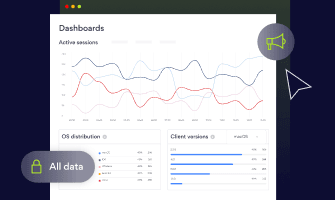Summary: Explore essential cybersecurity strategies to protect digital marketing campaigns, safeguard customer data, and maintain brand reputation in a complex field of security threats.
Effective digital marketing is vital for businesses today, but so is protecting it. However, the rapid expansion of this field also exposes companies to increasing cybersecurity threats. Data breaches, phishing attacks, and malicious ads can jeopardize sensitive information, disrupt digital marketing campaigns, and damage a company's reputation.
In 2023, cybercrime damages were estimated at $8 trillion globally and are expected to rise to $10.5 trillion annually this year. Marketing platforms are frequent targets due to their access to customer data and advertising networks.
As cybersecurity threats are here to stay, marketers must prioritize cybersecurity to ensure the safety of their campaigns, data, and reputation. Ensuring robust cybersecurity measures in digital marketing is no longer optional—it is essential.
Why cybersecurity is important in digital marketing
As businesses continue to invest heavily in digital marketing, securing these efforts becomes crucial. Without proper cybersecurity measures, brands risk losing sensitive data, damaging their reputation, and experiencing financial losses. Here’s why cyber security should be a top priority if the organization engages in many digital marketing activities:
Protecting customer data
Digital marketers handle vast amounts of personal data, including customer names, email addresses, and payment details. This makes them a prime target for cybercriminals who seek to exploit vulnerabilities in marketing platforms. A single breach can expose thousands—or even millions—of records, leading to financial and legal consequences. Implementing operational security measures helps protect this sensitive information and build customer trust.
Maintaining brand reputation
A security breach can significantly damage a brand’s reputation. When customer data is compromised, trust is lost, which can lead to decreased customer loyalty, negative publicity, and revenue loss. Consumers expect brands to safeguard their personal information, and a failure to do so can have lasting repercussions. Cyber security measures are essential to protect sensitive information and maintain the brand’s credibility.
Ensuring business continuity
Cyber-attacks can disrupt websites, analytics tools, and digital marketing platforms, leading to downtime and financial losses. Marketing teams drive traffic to their websites for conversions, and any disruption to the website can derail key initiatives. If a website crashes, marketers will feel significant turbulence, as their campaigns rely heavily on seamless access to e-commerce stores or SaaS products. Strong security measures can help businesses ensure seamless operations and avoid costly interruptions.
Compliance and regulations
Laws such as GDPR and CCPA require businesses to secure customer information and respect privacy. Failure to comply with these regulations can result in hefty fines, legal battles, and reputational damage. Digital marketers should collaborate closely with infosec teams to align marketing practices with legal requirements, ensuring both compliance and consumer protection.
Cybersecurity that keeps your marketing moving
Secure your campaigns, data, and platforms—all in one go
Main cyber threats in digital marketing
The digital marketing field is full of opportunities—but also risks. While attackers may target vulnerabilities in digital marketing platforms, we have limited control over those weaknesses. Cybercriminals often aim to gain access to platforms containing sensitive customer information by stealing credentials or guessing login details. Focusing on these areas allows us to take proactive measures to protect data and mitigate risks.
Phishing attacks
Phishing is one of the most common threats. Cybercriminals use fake emails, messages, and even social media ads to trick marketers into revealing login credentials or downloading malicious attachments. These phishing attacks often appear as legitimate requests from trusted sources, making them difficult to detect. Once attackers gain access to accounts, they can manipulate marketing assets, hijack accounts, send fraudulent emails, and compromise customer information.
Data breaches
Marketing teams rely on CRM systems, email lists, and customer databases to manage relationships and target audiences effectively. Unfortunately, these platforms are prime targets for attackers. A data breach can expose customer information, financial records, and internal business data, leading to financial losses, regulatory penalties, and reputational harm.
Account takeover attacks
In these attacks, cybercriminals steal credentials to gain unauthorized access to your accounts, such as PPC platforms or social media profiles. Once they have control, they can misuse your budget or damage your brand reputation by deleting content and impersonating you.
This type of attack can go unnoticed until significant harm has been done. To prevent them, implement strong authentication measures, use complex passwords, and enable multi-factor authentication (MFA) options.
Website and social media hijacking
Unauthorized access to a company’s website or social media accounts can lead to misinformation, fraudulent promotions, and reputational damage. Bad actors can post misleading content, redirect visitors to malicious sites, or delete valuable digital assets. Enforcing strict access controls and monitoring login activity can help prevent such incidents.
Click fraud
Bots and automated scripts inflate ad metrics by generating fake clicks, leading to wasted ad spend and distorting campaign results. Click fraud can drain digital marketing budgets while providing no real engagement or conversions. Marketers should leverage fraud detection tools to identify suspicious activity and mitigate financial losses.
DDoS Attacks
Distributed Denial of Service (DDoS) attacks can overwhelm a brand’s website, CRM systems, or advertising networks by flooding them with excessive traffic. This results in website downtime, disrupted marketing campaigns, and lost revenue. A well-orchestrated DDoS attack can prevent users from accessing online stores, landing pages, and promotional materials, directly impacting customer engagement and sales.
Recognizing these cybersecurity threats helps marketers take proactive steps to secure their campaigns, ensuring both data integrity and customer trust.
Email marketing threats and how to mitigate them
Email campaigns are powerful tools for engaging customers, nurturing leads, and driving sales. However, they are also one of the most targeted channels for cyber threats, as attackers exploit the trust between brands and their audiences.
One of the biggest risks in email marketing is phishing, where cybercriminals send fraudulent messages that appear to come from a trusted brand. These emails often contain malicious links or attachments designed to steal credentials, infect devices with malware, or trick recipients into making unauthorized transactions.
Business Email Compromise (BEC) is another serious threat, where attackers hijack or spoof official company emails to send fake invoices or payment requests. Additionally, email spoofing—where attackers forge sender information—can mislead recipients into believing that fraudulent messages are legitimate, leading to scams that damage trust in a brand.
To mitigate these risks, businesses should implement authentication protocols like two-factor authentication, SPF, DKIM, and DMARC, which help verify sender identities and prevent spoofing. Secure email gateways can filter out phishing attempts and malware before they reach inboxes, reducing the chances of a breach.
Marketers should also be trained to recognize suspicious emails, avoid clicking unknown links, and report potential scams. Furthermore, encrypting data and monitoring for brand impersonation can help protect both businesses and their audiences. By prioritizing email security, digital marketers can maintain trust, safeguard sensitive information, and prevent costly cyber incidents.
Related articles

Joanna KrysińskaMar 20, 202512 min read

Agnė SrėbaliūtėFeb 25, 20258 min read
Best cybersecurity practices for digital marketers
From securing confidential data to preventing fraudulent activities, following cybersecurity best practices keeps your marketing campaigns safe and your brand reputation strong. Here are some key measures every marketer should adopt:
1. Implement layered authentication measures
Using multi-factor authentication (MFA) or two-factor authentication (2FA) significantly reduces the risk of unauthorized access to digital marketing platforms. These measures require an additional layer of verification beyond just a password, making it more difficult for cybercriminals to infiltrate accounts.
Additionally, check if your platform supports IP allowlisting, which adds another layer of security by restricting access to specific IP addresses. Effective identity access management, combined with these authentication methods, has been shown to prevent over 50% of potential breaches, showcasing its critical role in protecting sensitive information.
2. Use strong, unique passwords
While MFA provides an extra layer of security, it is not a replacement for strong passwords. Weak or reused passwords remain one of the most exploited vulnerabilities in cyber-attacks. Digital marketers should use complex, unique passwords for each account and change them regularly. Additionally, consider using Single Sign-On (SSO) methods whenever available, as they eliminate the need for traditional email and password combinations—if there’s no password created, it cannot be stolen.
A password manager can also help securely store and manage credentials, reducing the risk of compromised accounts. Encouraging employees to adopt strong password policies protects not only digital marketing data but also the broader business infrastructure.
3. Secure marketing platforms and data
Today, most tools are web-based, which means traditional software updates are less relevant. Instead, it’s crucial to focus on the smart selection of tools. Marketers often get mesmerized by features, capabilities, and pricing, but they must also consider important security factors.
When choosing a platform, check for security certifications, the option to enable multi-factor authentication (MFA), and other security features. Sometimes, it’s necessary to compromise on advanced capabilities in favor of tools that prioritize customer data security over flashy functionalities. This approach ensures that sensitive information remains protected against potential threats.
4. Use enterprise browsers
Enterprise browsers like Chrome Enterprise, Edge for Business, and the upcoming NordLayer's Business Browser offer built-in security features such as malware protection, phishing prevention, and sandboxing, significantly reducing cyber risks for marketing teams. For IT administrators, these browsers enable policy enforcement, extension management, and data loss prevention (DLP), ensuring company-wide security compliance.
5. Monitor and analyze network traffic
Using security tools such as NordLayer's network visibility solutions helps detect unauthorized access and anomalies within the network. While marketers typically focus on campaign performance, continuous network monitoring is essential for IT and security teams. It enables them to identify suspicious activity, detect potential breaches early, and take preventive action before serious damage occurs. This proactive approach ensures that marketing data remains secure and protected from cyber threats.
6. Educate teams on cybersecurity
Training marketers to recognize phishing attacks and cybersecurity threats can prevent potential breaches. Many cybersecurity firms offer training programs tailored for digital marketing teams, helping employees stay informed about possible security risks. Awareness and vigilance play a key role in reducing cyber threats.
7. Limit access to sensitive data
Only grant necessary permissions to team members handling digital marketing campaigns. Implementing role-based access control (RBAC) strengthens cyber security by restricting access based on job responsibilities.
Marketing managers should collaborate with the IT and security teams to inform them about new sensitive data locations and ensure that appropriate network segmentation strategies are implemented. By minimizing the number of people with access to confidential data, businesses can reduce the likelihood of insider threats and accidental exposure.
8. Use a secure VPN and Cloud Firewall
A business VPN encrypts internet connections, keeping remote teams and public Wi-Fi users secure. It's also widely used in marketing for testing ads in different regions. However, it’s important to use the VPN at all times, regardless of specific marketing needs, to enhance overall security. Pairing it with a Firewall-as-a-Service, such as NordLayer's Cloud Firewall, further strengthens protection by blocking malicious traffic and controlling access to marketing tools.
A cloud firewall ensures that only authorized teams and departments can access specific environments, safeguarding sensitive information such as future campaign plans, customer data, and commercial secrets. By restricting access to only those who need it, businesses can prevent unauthorized exposure and maintain the confidentiality of critical marketing assets. It’s essential for marketers to collaborate with the IT team to ensure proper configuration and management of these security measures.
9. Secure your email workflows
Use authenticated email protocols (SPF, DKIM, DMARC), scan outbound content for risks, and secure your subscriber databases. Educating your team and regularly auditing your email marketing tools can significantly reduce security risks while maintaining trust with your audience.
10. Monitor ad campaigns for fraud
Regularly reviewing ad performance and using fraud detection tools can help identify click fraud and bot traffic, protecting your ad spend. Marketers should work with trusted advertising platforms that offer built-in fraud prevention mechanisms to ensure ad budgets are used effectively.
Strengthen your cybersecurity digital marketing with NordLayer
To protect digital marketing strategies from cybersecurity threats, NordLayer offers comprehensive security solutions that enhance operational security measures:
Business VPN: Ensures encrypted internet connections, protecting personal data from cyber threats.
Cloud Firewall: Provides secure access control to marketing platforms and protects sensitive data from unauthorized users.
Password management: Securely stores and manages credentials, reducing the risk of compromised accounts.
MFA & IP allowlisting: Enforces security measures before users connect to sensitive environments.
By implementing NordLayer’s security solutions, businesses can safeguard data stored in digital marketing tools, protect customer information, and maintain their company’s reputation. Learn more about e-commerce cybersecurity and retail cybersecurity to strengthen your cybersecurity framework today.
Cybersecurity in digital marketing is no longer an afterthought—it’s a necessity. As cyber threats continue to grow, businesses must remain proactive in implementing strong security measures. Taking the right precautions ensures the long-term success of marketing efforts while protecting customers and brands from potential security risks.

Agnė Srėbaliūtė
Senior Creative Copywriter
Agne is a writer with over 15 years of experience in PR, SEO, and creative writing. With a love for playing with words and meanings, she crafts content that’s clear and distinctive. Agne balances her passion for language and tech with hiking adventures in nature—a space that recharges her.











